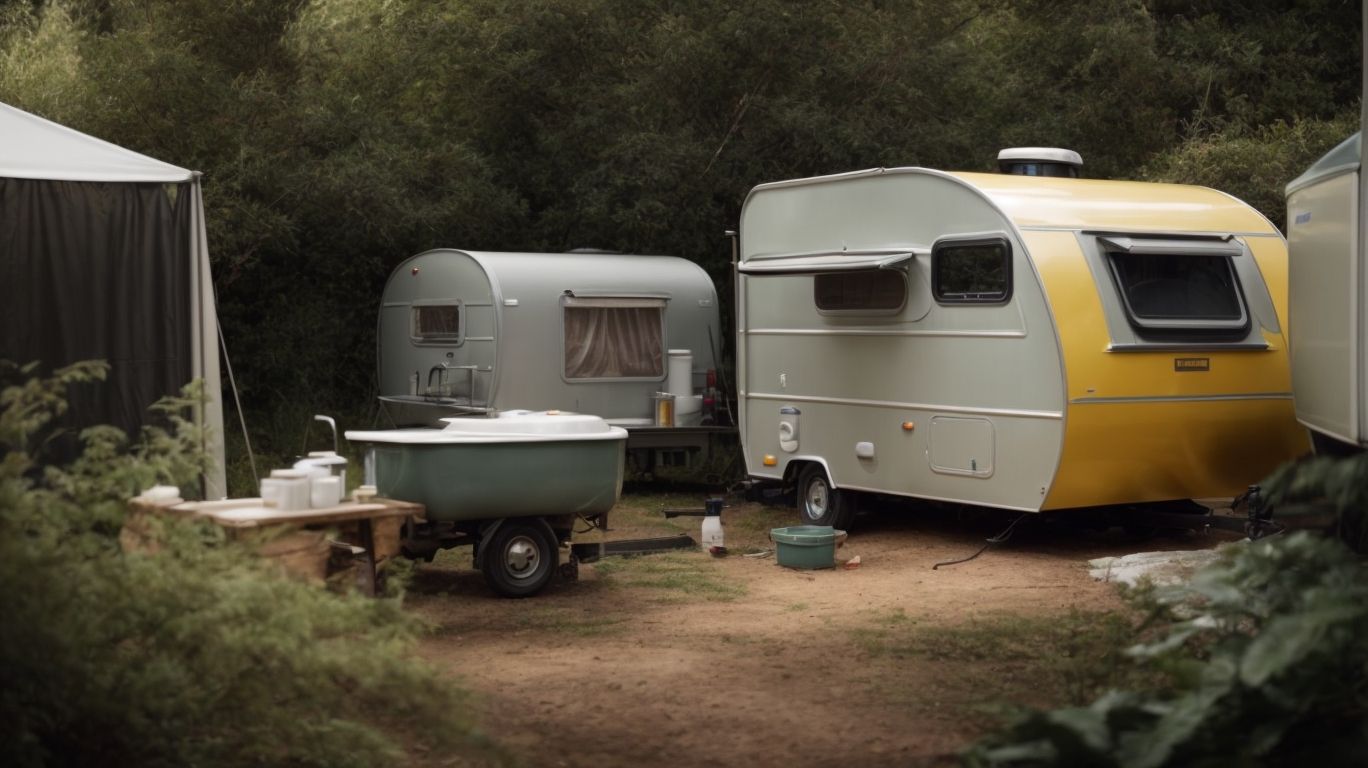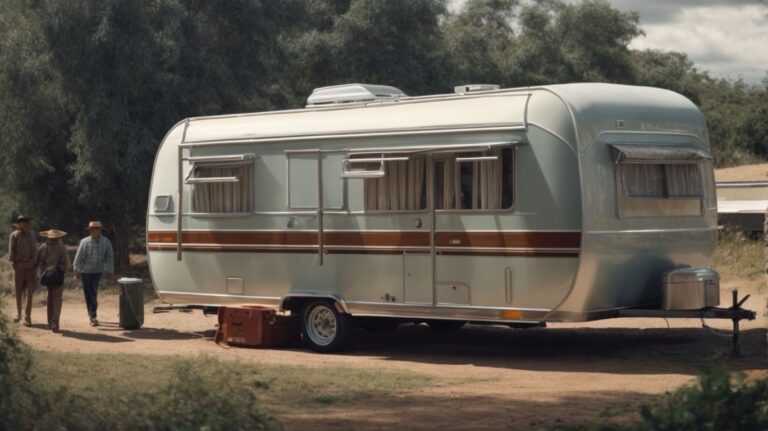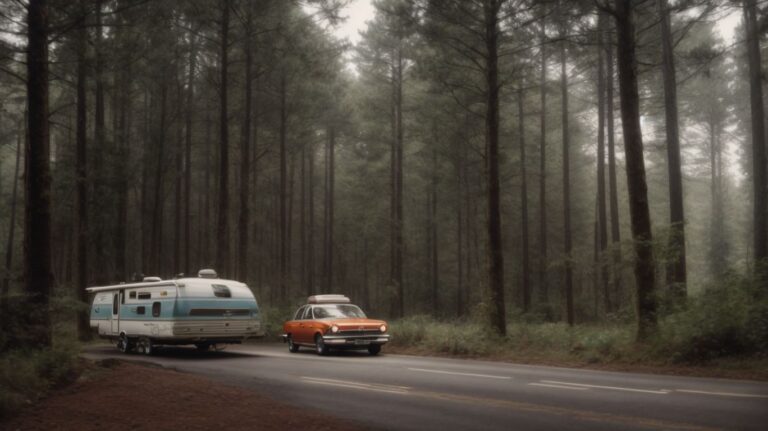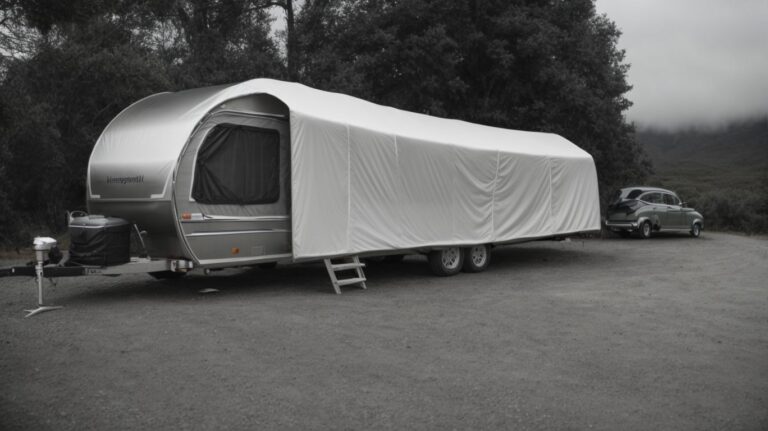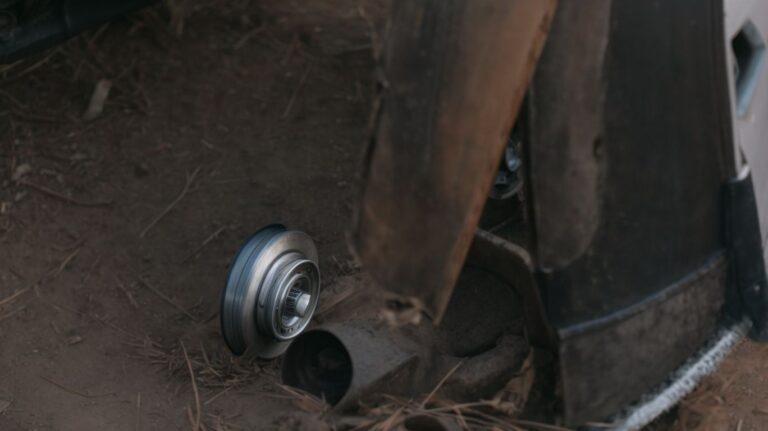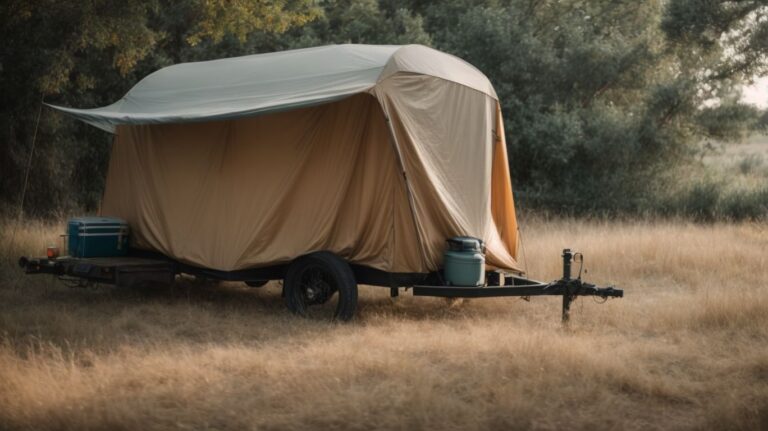Disposal Demystified: Where Does Caravan Toilet Waste Go
Curious about what happens to caravan toilet waste?
We explore the ins and outs of caravan toilets, from how they work to the different types available.
Delve into the options for disposing of caravan toilet waste, including the environmental impacts of each method.
For environmentally-conscious caravan owners, we share tips on how to minimize their impact.
Buckle up and let’s dive into the world of caravan toilet waste disposal!
Key Takeaways:
What Is a Caravan Toilet?
A Caravan Toilet, commonly known as a cassette toilet, is an essential feature in RVs and camper vans, providing a convenient bathroom solution for travelers on the road.
These toilets are designed to be compact yet functional, typically featuring a flush mechanism, a waste-holding tank, and a vent for odor control. Leading manufacturers like Thetford and Dometic are renowned for their high-quality caravan toilet systems. In RVs, waste from the toilet is stored in black tanks located underneath the vehicle until it can be properly disposed of. Having a bathroom in a mobile vehicle is crucial for long trips, ensuring comfort and hygiene for travelers.
How Does a Caravan Toilet Work?
Motion Activated RV Step Lights, 10 LED Battery Operated Motorhome Motion Sensor led Light Strip, Magnetic Night Light Bar for Motorhome Travel,Travel Trailers, Camper (2 Pack)
- 【Infrared Induction Motion Detection】Motion sensor light on the PIR sensor can detect human movement, 10 feet once your approach is detected, the rv step lights will automatically turn on in the dark, in the absence of detected motion or other light sources, 18 seconds after the automatic shutdown, a large degree of power savings and improved durability.
Camco TST MAX RV Toilet Treatment Drop-INs - Control Unwanted Odors & Break Down Waste and Tissue - Safe Septic Tank Treatment - Orange Scent, 30-Pack (41183)
- Toilet Deodorizer With Reactive Odor-Eliminating Technology: Experience a powerful RV odor eliminator that stops RV black tank odors for up to 7 days. Just (1) toilet drop in treats camper toilets with up to a 40-gallon tank.
THANSTAR Collapsible Dish Drying Rack Portable Dinnerware Drainer Organizer for Kitchen RV Campers Travel Trailer Space Saving Kitchen Storage Tray
- 【Food Grade Material】Made from eco-friendly PP+TPR material that is BPA Free and Food-Grade. The flexible material allows the dish strainers for kitchen counter to collapse flat for easy space-saving and storage, making the most of your kitchen countertop.
Camco RhinoFLEX 20-Ft RV Sewer Hose Kit - Features Clear Elbow Fitting w/Removable 4-in-1 Adapter - Connects to 3” Slip or 3”/3.5”/4” NPT Threaded Sewer Connection (39742)
- Superior RV Tank Dumping: Streamline RV holding tank dumping with Camco’s RhinoFLEX 20' Camper Sewer Hose Kit. Built tough & flexible, this all-inclusive RV septic hose system provides simple & effective tank dumping on your camping adventures.
Camco Tastepure RV Water Filter - New & Advanced RV Inline Water Filter with Flexible Hose Protector - GAC & KDF Water Filter - Made in USA - Camping Essentials for Fresh Drinking Water (40043)
- Advanced 6-Step Filtration Technology: Experience the extraordinary power of Hex-Flow Technology & its remarkable 6-step filtration process. Every layer works together to provide you with water that is exceptionally clean.





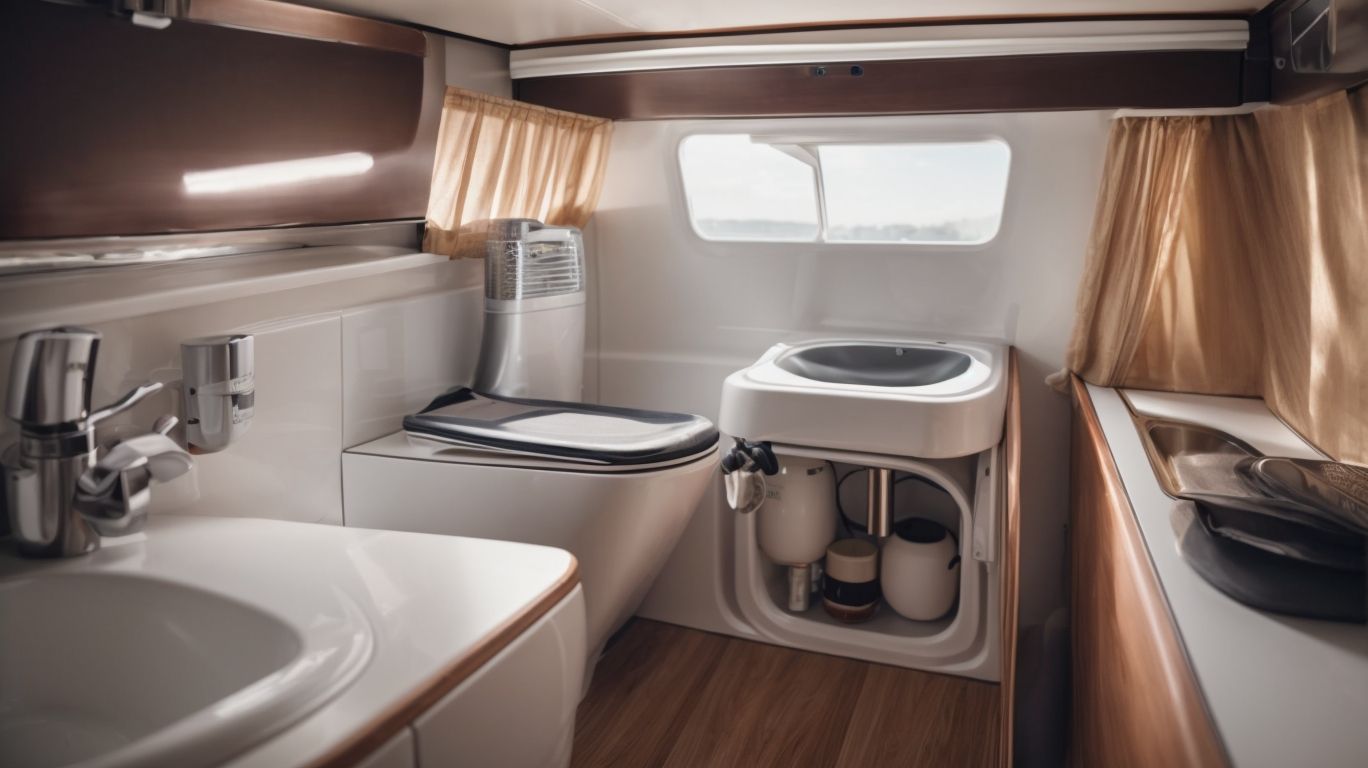
Credits: Motorcaravanning.Com – Richard Flores
A Caravan Toilet operates by using a flush button to release water from a water source into the toilet bowl, directing waste into a portable waste tank located within the vehicle’s limited tank space.
The flushing process in caravan toilets involves a simple yet efficient mechanism where the water source, often connected to an onboard tank or an external hookup, is controlled by a valve that opens upon pushing the flush button, allowing a specific amount of water to cleanse the bowl. The waste, mixed with water, then flows through a series of pipes into the portable waste tank, which requires frequent emptying depending on the usage and tank capacity. Challenges arise in managing tank space efficiently, as monitoring levels and optimizing space utilization are vital for extended journeys.
What Are the Different Types of Caravan Toilets?
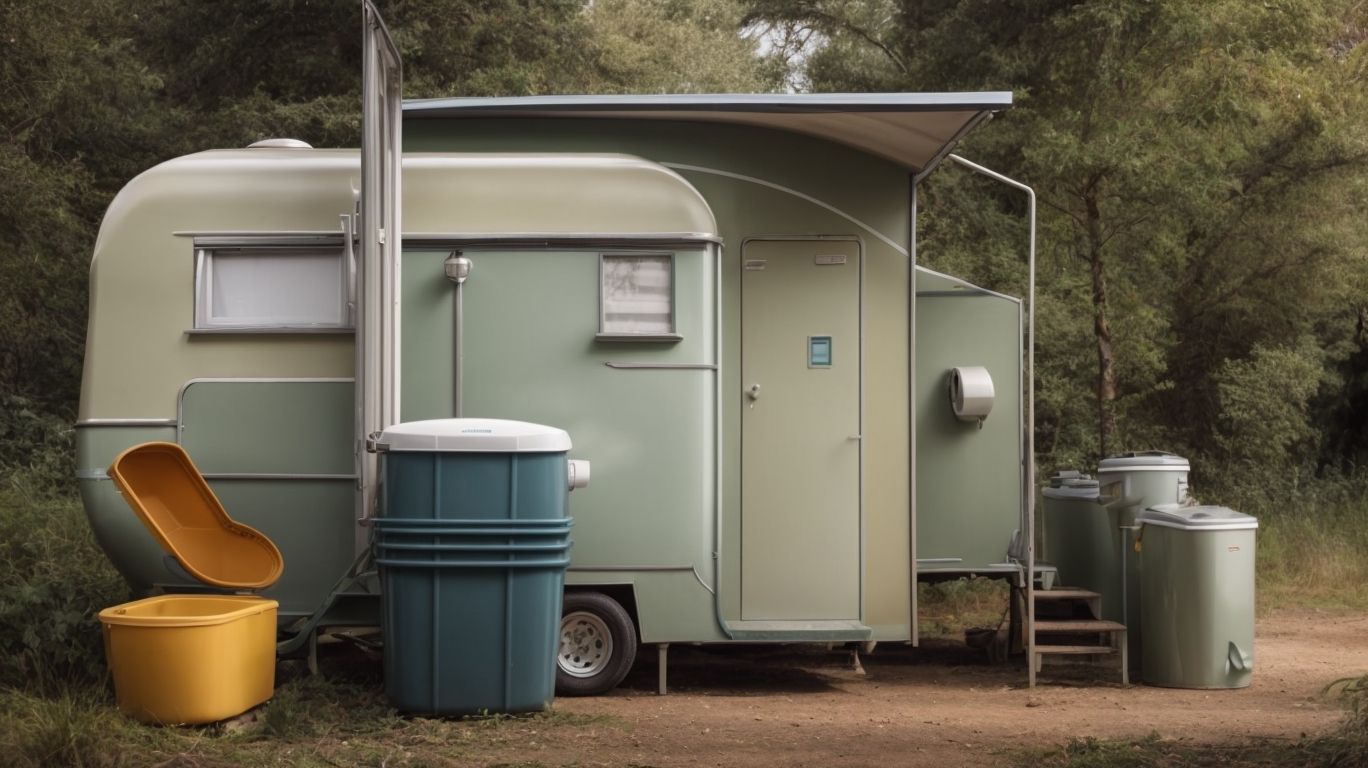
Credits: Motorcaravanning.Com – Adam Ramirez
Caravan Toilets come in various types, including portable toilets, composting toilets, and models designed specifically for Class B RVs and Class A gas motorhomes, catering to diverse traveler needs.
Portable toilets are a popular choice due to their convenience and easy installation in small spaces. They are typically compact, lightweight, and easy to clean, making them ideal for short trips or camping adventures. On the other hand, composting toilets offer an eco-friendly solution by converting waste into compost without the need for chemicals or water. These toilets are becoming more popular among environmentally-conscious travelers looking for sustainable options.
Cassette Toilets
Cassette Toilets are self-contained units that can be easily removed and emptied at dump stations, requiring regular maintenance to manage chemicals and ensure proper functioning, with some models offering connections to septic tanks for extended use.





These innovative toilets are popular in RVs and campervans due to their convenience and versatility. Cassette toilets have a built-in waste tank that can be detached for disposal at designated dump stations, simplifying the process for users. To maintain hygiene and efficiency, specific chemicals are utilized to break down waste and control odors within the unit.
- Regular cleaning and chemical replenishment are essential to prevent odor buildup and ensure smooth operation.
- For long-term usage, some cassette toilets feature the option to connect to septic tanks on campsites or properties, offering an environmentally-friendly disposal solution.
Porta Potties
Porta Potties, commonly known as portable toilets, offer a convenient sanitation solution for outdoor events or camping, available through various retailers like Amazon and requiring periodic cleaning and maintenance of valves for optimal functionality.
Portable restrooms have become an essential part of any outdoor setting, ensuring the comfort and hygiene of participants. Platforms like Amazon provide a vast array of options, making it easy to select the right Porta Potty that fits the requirements. Proper maintenance is crucial to extend the lifespan of these units – regular cleaning not only enhances user experience but also contributes to overall hygiene standards. Paying attention to valve maintenance prevents leaks and ensures seamless operation, enhancing durability and usability.
Composting Toilets
Composting Toilets utilize natural processes to break down waste materials into compost, often requiring specialized tank treatment products and the practice of keeping the lid down to facilitate decomposition and manage odors effectively.
One essential aspect of composting toilets is the concept of aerobic decomposition, where the waste is broken down by microorganisms in an oxygen-rich environment. This process helps convert human waste into nutrient-rich compost, which can be safely used as fertilizer for plants.
Proper maintenance of composting toilets involves regularly emptying the composting chamber and adding bulking agents like sawdust to aid in the decomposition process. This careful balance of organic matter and oxygen ensures the efficiency of composting toilets in waste management and environmental sustainability.
What Are the Options for Disposing of Caravan Toilet Waste?
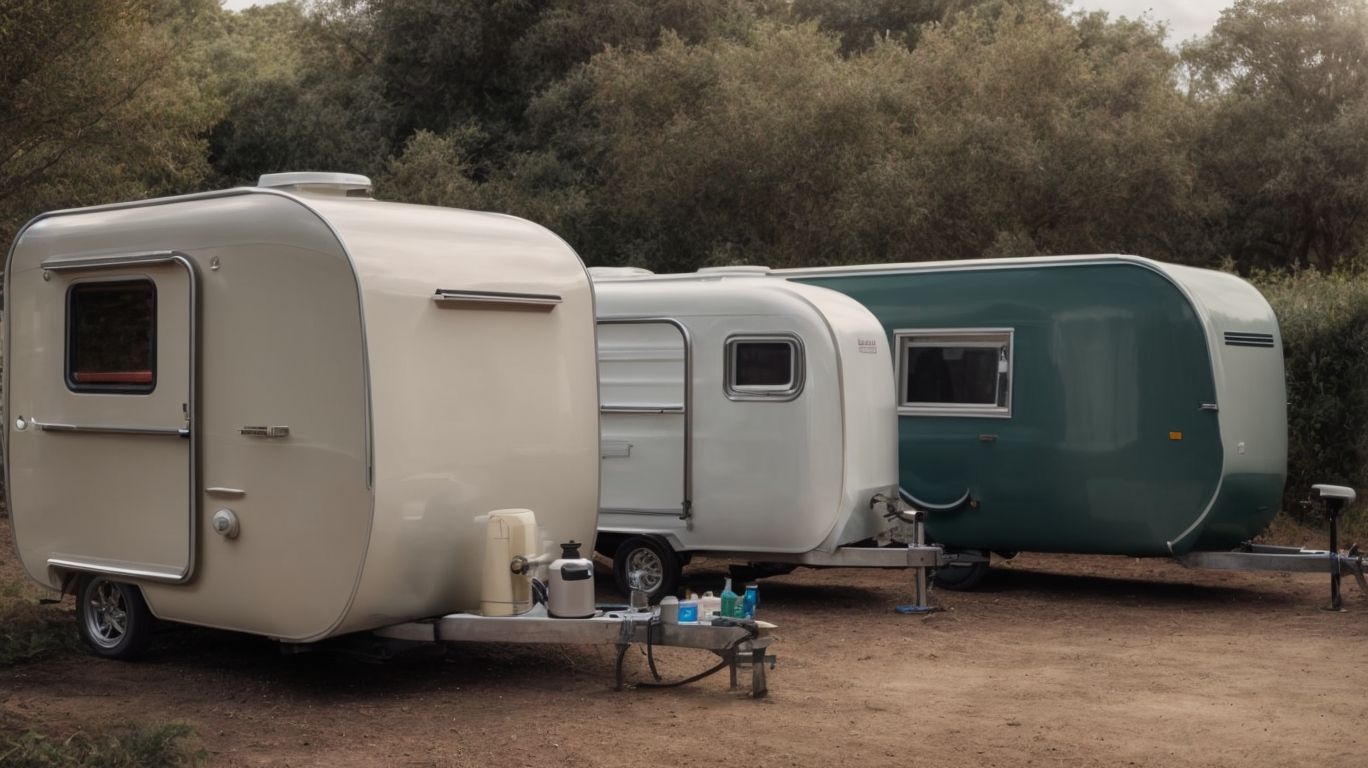
Credits: Motorcaravanning.Com – Nicholas Brown
Caravan owners have several disposal options for managing toilet waste, including utilizing dump locations, engaging vacuum or septic trucks for removal services, or directing waste to treatment plants for environmentally friendly processing.





When caravan owners are on the road or camping, dump stations provide a convenient solution for emptying their waste tanks. These stations are specially designed for recreational vehicles, offering a safe and hygienic way to dispose of black and gray water.
Another option is to hire vacuum trucks or septic trucks that can efficiently suck out the waste from the caravan’s tanks, providing a professional and hassle-free disposal method. For those looking to minimize their environmental impact, sending the waste to treatment plants ensures that it undergoes proper treatment and processing before being released back into the ecosystem.
Chemical Disposal Points
Chemical Disposal Points provide facilities for caravan owners to dispose of waste chemicals and conduct tank maintenance, with products like Thetford cleaner and valve blades commonly used for effective sanitation management.
Thetford cleaner is a specially formulated product designed to efficiently break down waste chemicals and keep tanks clean and odor-free. Caravan owners often rely on the power of Thetford cleaner to maintain hygiene standards in their tanks.
- Valve blades play a crucial role in regulating the flow of chemicals during disposal, ensuring smooth operations and preventing leaks or spills that could harm the environment.
- Proper sanitation practices at disposal points are essential to prevent contamination and maintain a clean environment for all users. Regular cleaning and disinfection procedures help reduce the risk of harmful microorganisms spreading.
The combination of utilizing products like Thetford cleaner, understanding the role of valve blades, and following sanitation protocols at disposal points is vital for safe and effective chemical disposal in caravan systems.
Waste Treatment Plants
Waste Treatment Plants offer advanced waste processing solutions for caravan toilet waste, utilizing microbes to break down waste efficiently and catering to diverse waste sources, including event waste directed for treatment plant processing.
These treatment facilities play a pivotal role in managing caravan toilet waste by employing a variety of microbial breakdown processes. The treatment plants are equipped to handle the diverse array of waste materials efficiently, ensuring effective decomposition through specialized treatment methods.
Waste treatment plants are crucial for managing event waste, which often requires specialized handling due to the unique characteristics of the waste stream. By incorporating advanced technologies and specialized processes, these plants can effectively treat event waste, contributing to overall waste management efforts.
Biodegradable Bags
Biodegradable Bags offer an eco-friendly waste disposal option for caravan owners, allowing for the safe disposal of disposable waste materials into drain fields without harming the environment or water table.
These bags are specifically designed to break down naturally over time, reducing the need for conventional plastic bags that can persist in the environment for hundreds of years. The use of biodegradable bags in caravan toilets helps to minimize the ecological footprint associated with waste management and promotes sustainable practices among travelers. Not only are they environmentally conscious, but these bags also provide a convenient and hygienic solution for handling waste while on the go.





What Are the Environmental Impacts of Caravan Toilet Waste Disposal?
The disposal of caravan toilet waste poses environmental challenges, including the risk of chemical pollution, water contamination, and potential impacts on local wildlife populations.
When caravan toilet waste is not properly managed, it can release harmful chemicals into the environment, endangering water sources and biodiversity. The chemicals in the waste can seep into the soil and waterways, affecting the delicate balance of ecosystems. This pollution can disrupt the natural habitat of animals and plants, causing long-lasting damage to the environment.
Chemical Pollution
Chemical Pollution resulting from caravan toilet waste disposal can lead to adverse effects on public restrooms, highlighting the importance of chemical-free waste management practices to safeguard environmental and public health.
Caravans, often used for recreational purposes, can inadvertently contribute to environmental degradation through the release of various harmful chemicals into water sources and soil. When caravan waste, containing chemical pollutants, is improperly disposed of, it poses a significant risk not only to public health but also to the ecosystem, disrupting the delicate balance of nature. Public restrooms, being frequented by a large number of people daily, are particularly vulnerable to the repercussions of chemical pollution from caravan waste, necessitating urgent attention to implement sustainable, chemical-free waste disposal solutions.
Water Contamination
Water Contamination resulting from improper caravan toilet waste disposal can endanger water sources, underlining the importance of proper valve maintenance, lid closure, and preventing contamination of the water table.
Regular maintenance of valves in caravan toilets is crucial to prevent leaks and ensure efficient waste disposal. Properly sealing the lid after each use is essential to contain odors and minimize the risk of spills. By following these simple protocols, not only can caravan owners safeguard water sources from contamination, but they also contribute to the preservation of our environment. It is imperative to be mindful of the impact of caravan waste on water tables and take proactive measures to safeguard this valuable resource.
Impact on Wildlife
Improper caravan toilet waste disposal can have detrimental effects on local wildlife populations, necessitating odor control measures, lid closure practices, and managing water levels to minimize negative impacts on wildlife habitats.
When caravan waste is not properly managed, the noxious odors emitted can disturb the natural behavior of animals and disrupt the delicate balance of ecosystems. Implementing strategic odor mitigation strategies like using enzymatic additives or chemicals that break down waste efficiently can significantly reduce the negative impact on local wildlife. Ensuring tight closure of toilet lids can prevent animals from accessing the waste, decreasing the risk of contamination and potential harm to the wildlife.
Monitoring and managing water levels in caravan waste tanks is crucial to avoid leakages and spillages that can contaminate surrounding areas. Water level management not only helps in preventing pollution but also maintains the integrity of the ecosystem and safeguards the health of the wildlife populations. By actively employing these practices, the detrimental effects of caravan waste disposal on wildlife can be effectively minimized.
How Can Caravan Owners Minimize Their Environmental Impact?





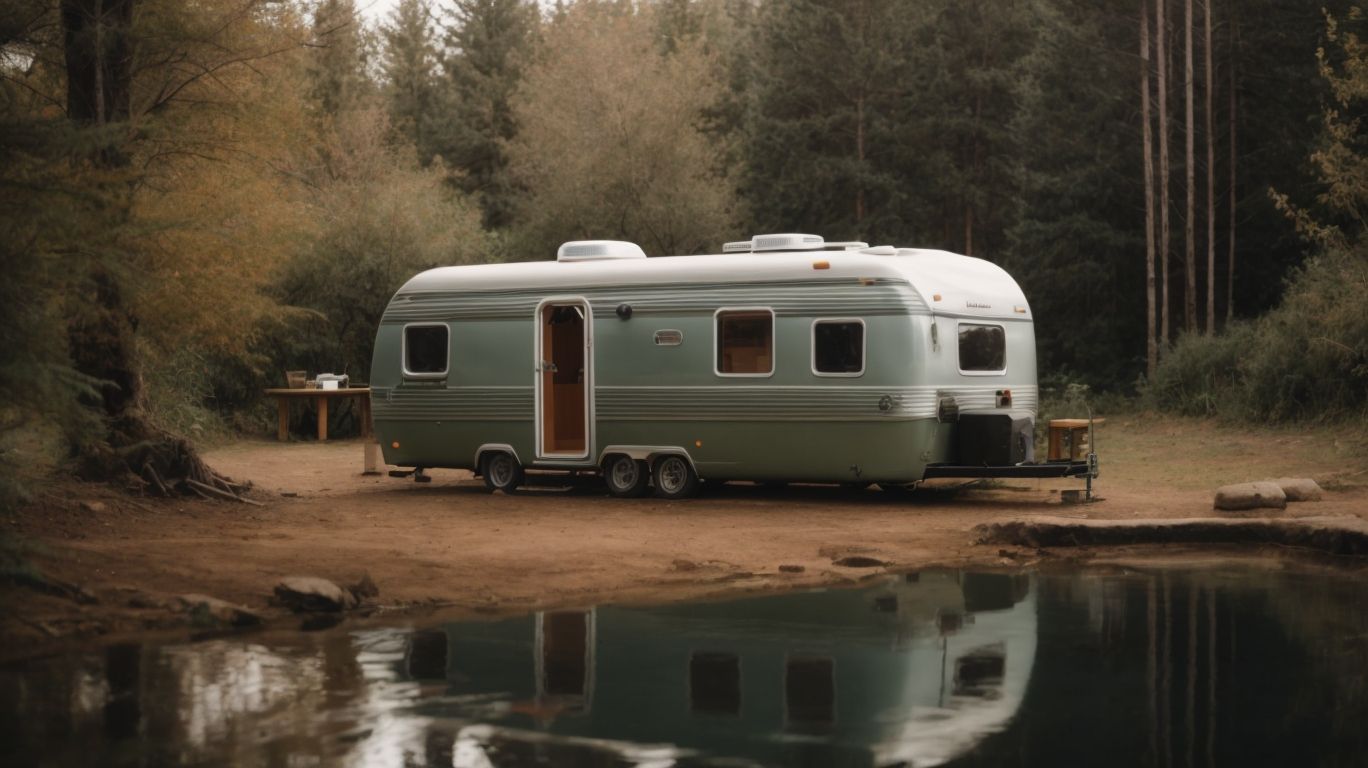
Credits: Motorcaravanning.Com – Bryan Lewis
Caravan Owners can reduce their environmental impact by opting for biodegradable products, considering composting toilets, utilizing septic tank connections, and exploring drain field-friendly waste disposal methods.
Biodegradable products are an excellent option for caravan waste management as they break down naturally, reducing harmful chemicals in the environment.
Composting toilets are a sustainable choice that turns waste into valuable compost, minimizing the need for conventional sewage systems.
Connecting to a septic tank provides a contained system for waste disposal, ensuring proper treatment and minimizing contamination risks.
Exploring drain field-friendly methods allows caravan owners to efficiently dispose of waste without harming the surrounding ecosystem.
Use Biodegradable Products
Utilizing Biodegradable Products in caravan waste management can promote ecological sustainability, requiring proper valve maintenance, system adherence, and ensuring lids are kept down for effective waste decomposition.
Biodegradable products play a crucial role in minimizing the environmental impact of caravan waste disposal. By opting for these eco-friendly options, caravan owners can actively contribute to reducing pollution and conserving natural resources. Incorporating valve maintenance practices helps to ensure that the waste management system functions efficiently, enhancing the overall decomposition process.
Ensuring compatibility with the waste management system is essential for the successful decomposition of biodegradable waste. By utilizing products that align with the specific requirements of the system, caravan owners can maximize the decomposition efficiency and minimize any potential issues.





Dispose of Waste Properly
Properly Disposing of Waste from caravan toilets entails utilizing the full capacity of casette toilets, employing extendable handles for easy transport, incorporating wheeled systems for mobility, and ensuring waste disposal at designated locations.
Maximizing the capacity of casette toilets is crucial when on the road to avoid frequent emptying stops. This can be achieved by following the manufacturer’s guidelines on proper usage and maintenance. Utilizing extendable handles not only makes transporting the waste easier but also reduces the risk of spillage and mess. Wheeled systems provide added convenience, especially when navigating through campsites or waste disposal facilities. It is essential to always direct the waste to designated disposal sites to prevent environmental contamination and follow campground regulations for waste management.
Use a Composting Toilet
Adopting a Composting Toilet in caravan setups can offer ecological benefits, requiring understanding of casette doors, addressing FAQ queries related to composting toilets, and managing waste to safeguard the water table.
Composting toilets are gaining popularity for their environmentally friendly approach to waste management in caravan living. The design of casette doors in these toilets plays a crucial role in separating solid waste for composting. By utilizing natural processes of decomposition, composting toilets break down waste into nutrient-rich compost, reducing the environmental impact of traditional plumbing systems.
FAQs often revolve around the maintenance and odor control of composting toilets, which can be easily managed with proper care and upkeep.
Frequently Asked Questions
What is the best way to dispose of caravan toilet waste?
The best way to dispose of caravan toilet waste is by using a designated disposal point, which can usually be found at campsites and service stations.
Is it safe to dispose of caravan toilet waste in a regular toilet?
No, it is not safe to dispose of caravan toilet waste in a regular toilet. The waste is not treated with chemicals like a normal sewage system, and can cause blockages and other issues.
Can I dispose of caravan toilet waste in nature?
No, it is not recommended to dispose of caravan toilet waste in nature. This can be harmful to the environment and may result in fines for littering.
What happens to caravan toilet waste after it is disposed of?
After caravan toilet waste is disposed of, it is often transported to a treatment facility where it is treated and processed before being discharged into the appropriate sewage system.





How often should I empty my caravan toilet waste tank?
The frequency of emptying your caravan toilet waste tank will depend on the size of your tank and the number of people using it. It is recommended to check and empty the tank before it reaches its maximum capacity.
Are there any rules or regulations for disposing of caravan toilet waste?
Yes, there are regulations in place for the disposal of caravan toilet waste. It is important to follow these rules to protect the environment and prevent any potential health hazards.

